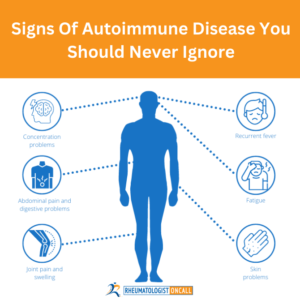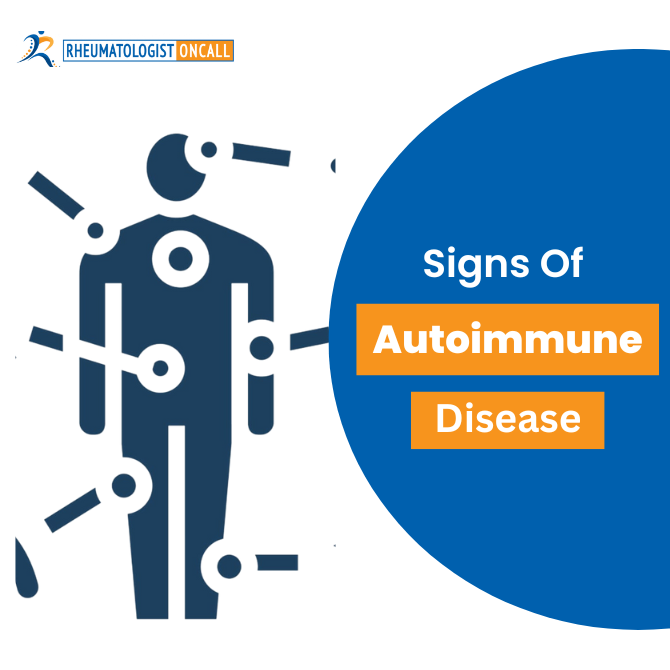SHARE
Are you struggling with an unexplainable, lingering fatigue? Is there persistent pain or swelling in your joints? Maybe you’ve noticed a sudden rash, or your hair seems to be thinning out of the blue. Or perhaps it’s something subtler, like unrelenting dryness or mysterious Weight loss.
These aren’t arbitrary symptoms – they could be your body signaling an underlying autoimmune disease. Intrigued? Then you’re definitely in the right place.
In this comprehensive guide, I’ll break down the top 10 signs of autoimmune diseases that you shouldn’t ignore. These signs could point towards conditions like Lupus, Sjogren’s, Vasculitis, Giant Cell Arteritis, Rheumatoid Arthritis, Dermatomyositis, and Gout. If you’ve been experiencing any unexplained symptoms, this information could hold the key to your health puzzle.

Sign 1 – Neverending Fatigue
This isn’t about ordinary tiredness. Fatigue associated with autoimmune diseases like Lupus and Rheumatoid Arthritis is profound and enduring. It feels like you’re carrying a heavy load that doesn’t get lighter with rest. More than just sleepiness, relentless exhaustion can cloud your mind, sap your strength, and diminish your overall quality of life. Fatigue is a reflection of inflammation, which can drain all your energy, leaving you feeling persistently tired. Ever wondered what causes fatigue in people with autoimmune diseases and how to manage it?
Sign 2 – Joint Pain and Swelling
In the context of autoimmune diseases, joint pain and swelling aren’t just occasional or minor discomforts. They’re chronic and often intense. Conditions like Rheumatoid Arthritis often affect the smaller joints of your hands and feet, causing tenderness and movement difficulties. On the other hand, Gout can cause excruciating pain, frequently targeting the big toe. Do these symptoms sound familiar? Keep reading to understand more about these autoimmune signs.
Sign 3 – Persistent Dryness
Dryness, especially of the mouth and eyes, is a classic symptom of Sjogren’s syndrome, an autoimmune disease. This isn’t about minor skin dryness due to weather changes. It’s about severe, ongoing dryness that can affect your eyes, mouth, or even skin, making them feel gritty, hard to move, or flaky. Interested in learning more about Sjogren’s Syndrome? I have plenty of information to help you understand this condition better. You can watch this video on my Youtube channel or read on my blog.
Sign 4 – Skin Changes
Changes to your skin in autoimmune diseases are more than cosmetic concerns. They could indicate serious internal issues. Rashes, dry white patches, or skin ulcers could be signs of various autoimmune diseases. Dermatomyositis, Vasculitis, and Psoriasis each have distinct skin changes that signal these conditions.
Skin changes can refer to rashes, dry white patches or even skin ulcers. For example, in Dermatomyositis, you may notice a violet-colored rash on your eyelids, knuckles, or elbows.
In Vasculitis, there could be palpable purpura – raised, reddish-purple spots, which are actually areas of bleeding under the skin.
In psoriasis, you may see dry white itchy patches of skin, usually on the elbows, knees, scalp, and even genital area.
In lupus, you can have a butterfly rash that is disposed on the nose and the checks.
If you’ve noticed any unusual changes to your skin, it may be time to consult a specialist, like a rheumatologist.
Sign 5 – Persistent Low-Grade Fever
A low-grade, persistent fever is another telltale sign of an autoimmune condition. Unlike fevers associated with the common cold or flu, these fevers are relentless, usually low-grade, and often unresponsive to regular medications. Together with other symptoms like fatigue and joint pain, this type of fever could point toward conditions like Lupus and Rheumatoid Arthritis.
Sign 6 – Muscle weakness
This isn’t about feeling sore after an intense workout. It’s about a steady, progressive loss of muscle strength. Conditions like Polymyalgia Rheumatica and Dermatomyositis often result in significant Iakness around the shoulders and hips, making it difficult to rise from a seated position, climb stairs, or even reach for items on a high shelf.
Sign 7 – Neurological Symptoms
Tingling, numbness, or even brief vision loss can also point to autoimmune diseases like Lupus and Vasculitis. Persistent sensations of ‘pins and needles,’ often in your hands and feet, or episodes of blurry or double vision are serious signs not to be ignored, as they can indicate nerve inflammation or damage.
Rheumatoid arthritis can present with symptoms that look like carpal tunnel syndrome but most of the time, these symptoms are bilateral in month hands.
If you develop confusion, seizures, or even lose consciousness, those coils be signs of lupus.
If you develop headaches, these can be signs of Sjogren’s, lupus, and even giant cell arthritis.
If you develop acute loss of your vision, this again can be a sign of an autoimmune disease like Sjogren’s or GCA.
Sign 8 – Unexplained Iight Loss
If you’ve been losing weight without trying – without significant changes to your diet or physical activity levels – it’s a cause for concern. This could be a sign of malabsorption of nutrients or systemic inflammation, often seen in conditions like Giant Cell Arteritis or systemic vasculitis.
Sign 9 – Unusual Hair Loss
Losing more hair than the usual 50-100 strands a day can be a distressing signal of autoimmune diseases like Lupus and Vasculitis. Significant and often patchy hair loss leads to visible bald spots. It’s more than just an aesthetic concern – it’s a sign of underlying inflammation affecting the hair follicles. Even psoriasis that affects your scalp can lead to significant hair loss when you have ongoing and uncontrolled inflammation. You will continue to shed a lot of hair.
So pay attention to what is happening and call your doctor to send you to a specialist in an autoimmune disease like me or to send you to a dermatologist.
Before you try all those advertised products for hair on social media, think about why you are losing so much hair.
Sign 10 – Kidney Issues
Finally, problems with your kidneys, such as unexplained swelling in your legs and feet or changes in your urine, an itinerary that is read or foamy, could be signs of diseases like Lupus or ANCA vasculitis which commonly affects the kidneys.
This isn’t about the occasional fluid retention after a salty meal; this is about persistent, unexplained changes that can indicate underlying kidney inflammation or damage. This can be very dangerous, as you can even lose your kidneys.
So if you notice dark urine, blood in the urine, or even foamy itinerant, check immediately with your physician.
Conclusion:
Knowledge is power, and recognizing these signs can be the first step towards getting your needed help. Don’t ignore these signs – contact a specialist if you’re concerned. At Rheumatologist OnCall, I’ve dedicated myself to helping you navigate the complexities of autoimmune disease. I offer top-notch rheumatologists to guide you, all from the comfort of your home, removing barriers to quality care.
Your health is a priority. Don’t wait months to see a specialist when Rheumatologist OnCall is just a click away. Start your journey towards better health and a better future today. Remember, with us, care is always at your convenience. Take the first step now: Visit RheumatologistOnCall.com to schedule your virtual visit.
Experience Rheumatologist OnCall – where your health matters.














